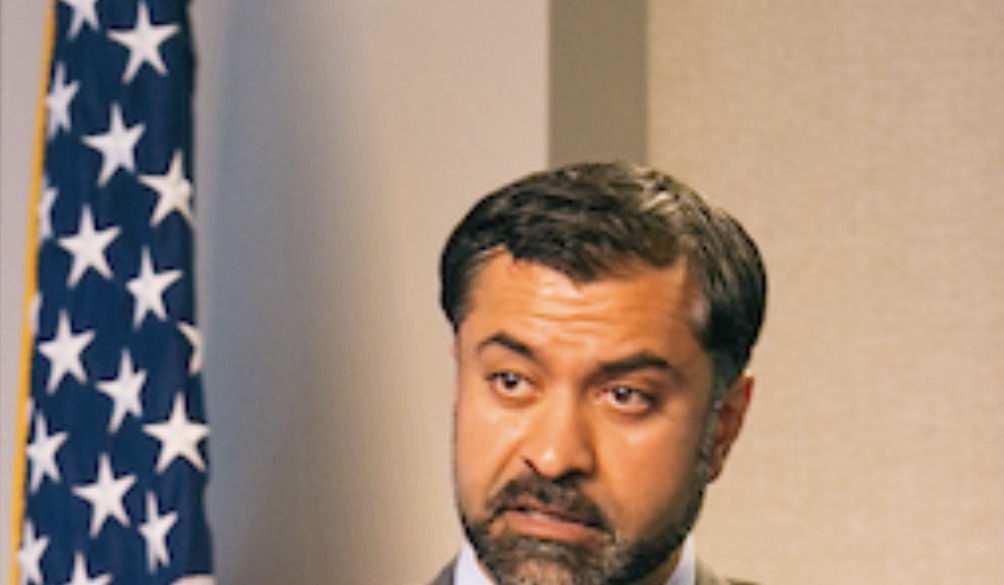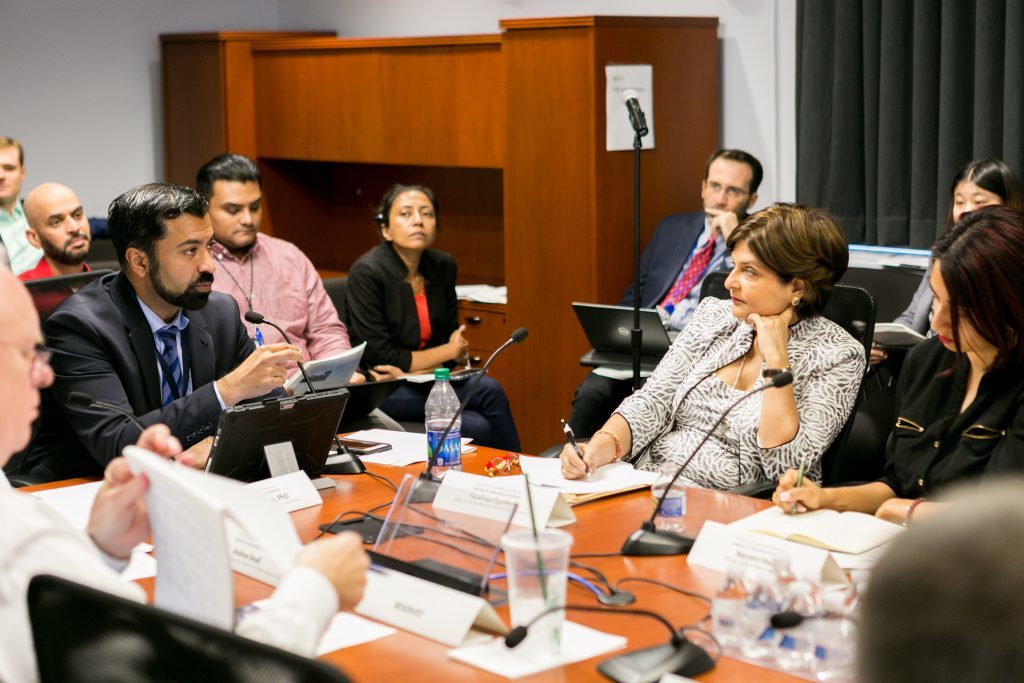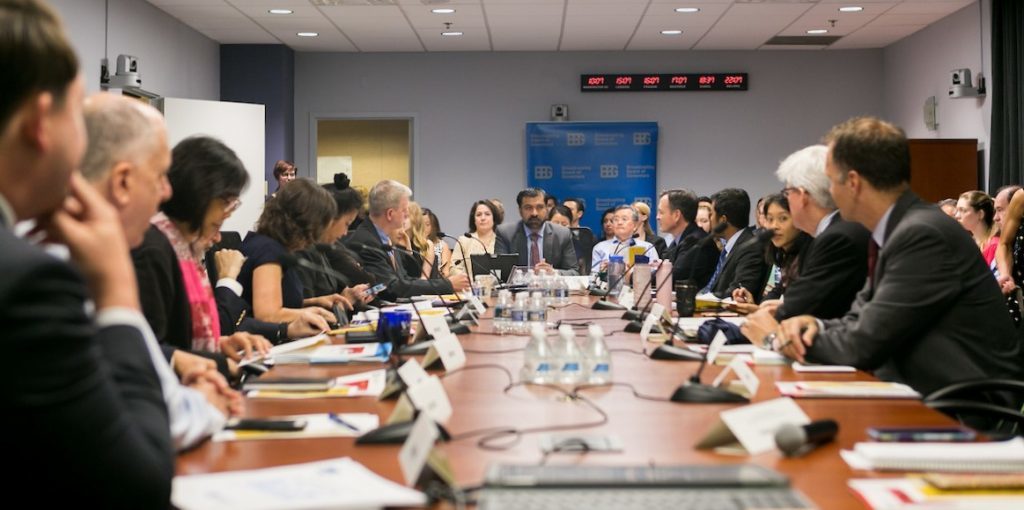BBG – USAGM Watch Commentary
UPDATE
BBG – USAGM Watch Commentary
The U.S. Department of Justice announced in a June 27, 2019 press release that a former senior official in the U.S. Agency for Global Media (USAGM) has pled guilty to stealing government money.
Previously USAGM had refused to provide BBG – USAGM Watch volunteer reporters with information on this case. The agency’s former name was the Broadcasting Board of Governors (BBG).
The DOJ press release paints a picture of mismanagement, corruption and lack of oversight within the senior levels of the $800 million U.S. Agency for Global Media which is responsible for such taxpayer-funded media as the Voice of America (VOA) and Radio Free Europe / Radio Liberty (RFE/RL). The current senior USAGM management team was assembled by USAGM CEO John F. Lansing who has been in charge of the agency since 2015.
UNITED STATES DEPARTMENT OF JUSTICE:
FOR IMMEDIATE RELEASE, June 27, 2019

Former Senior Official Pleads Guilty to Stealing Government Money
END OF UPDATE
At one time Chief Strategy Officer, Dr. Haroon Ullah was constantly seen in public with U.S. Agency for Global Media (USAGM) CEO John F. Lansing, but sources tell BBG – USAGM Watch that Dr. Ullah seems to have been strangely absent lately from his side. Dr. Ullah, who previously worked at the State Department, became better known outside of the agency thanks to his domestic and international travels to conferences and events at which he spoke about how USAGM spends its $685.2 million (FY18 budget request) of taxpayers’ money for media outreach. He was reportedly using consultants in the United States and abroad to help him chart the agency’s future. He was frequently praised by John Lansing in private and in public for his expertise.
Haroon Ullah’s photo is prominently shown on the USAGM website’s “Management Team” page. The site’s description of Dr. Ullah’s role makes him appear nearly as important to the success of the agency as that of his boss.
USAGM WEBSITE
The Chief Strategy Officer leads the Agency’s policy engagement within the broader U.S. government as well as with key stakeholders outside the federal government. The CSO focuses on strategic planning and initiatives to make the Agency more strategically relevant in the national security, foreign affairs, and global media spheres.
BBG – USAGM Watch has learned that journalists, who have sent inquiries to the USAGM Public Relations Office trying to learn from the agency about Dr. Ullah’s current activities, were met with silence.
Dr. Ullah’s bio on the USAGM website shows that it was last modified September 28, 2018.
USAGM WEBSITE
HAROON K. ULLAH
Chief Strategy Officer
As USAGM Chief Strategy Officer, Dr. Haroon Ullah oversees the Office of Policy and Research (OPR), including the elevation of USAGM’s policy engagement in the interagency, strategic planning and strategic initiatives functions and positioning within the broader U.S. government and with key stakeholders. In addition, he oversees USAGM’s Office of Internet Freedom (OIF), which focuses on the technological and innovative efforts to circumvent internet censorship around the globe. Ullah’s main responsibility is to lead USAGM to become a more strategically relevant agency within the national security, foreign affairs, internet censorship and global media spheres.
Ullah joins USAGM from the Department of State, where he most recently worked on Secretary Tillerson’s Policy Planning Staff covering digital innovation, public diplomacy and public/private partnerships. He previously advised three Secretaries of State, traveled with Ambassador Richard Holbrooke’s Afghanistan/Pakistan team and started the first-ever public diplomacy countering violent extremism office at any American Embassy in the world as the Director of the Community Engagement Office at the U.S. Embassy in Pakistan.
He is also a visiting professor at Georgetown University and is a Term Member of the Council on Foreign Relations. Ullah has also served as a senior Harvard University Belfer Fellow and International Director of SAB Negotiation, overseeing private sector deals worth over $350 million.
Ullah has an MA from Harvard’s Kennedy School of Government and a joint Ph.D. from Harvard and the University of Michigan, and he was a William J. Fulbright Fellow, a Harvard University Presidential Scholar, and a Woodrow Wilson Public Service Fellow. His award-winning books include Vying for Allah’s Vote (Georgetown University Press), The Bargain from the Bazaar (Public Affairs Books), and recently released Digital World War (Yale University Press), which focuses on new uses for technology, transmedia and digital content.
Last modified: September 28, 2018
Here are some links to Dr. Ullah’s appearances on behalf of USAGM, some of them in the company of John Lansing.
- Hudson Institute Event: A Challenging Crossroad: Media and Politics in Iran BBG CEO and Director John F. Lansing
- 2018 World Press Freedom Day with BBG, GWU & CPJ
- Disinformation, Challenges and Myths, with Dr. Haroon K. Ullah
- Building Trust: the Ultimate Challenge in an Age of Global Media Voices, Sounds and Images by Alan Heil
- Countering Violent Extremism
USAGM WEBSITE
Pakistan and Information Warfare
by Dr. Haroon Ullah October 9, 2018
Pakistan recently saw a political upheaval with the election of cricketer-turned-politician, Imran Khan’s party rise to power. PTI or Pakistan Tehreek-e-Insaf’s win is exceptional not only because of its charismatic leader, but mainly because it is the first time in decades that the alternating governments between Bhutto’s party and Sharif’s party have been sidelined. Khan is being hailed (and claimed by some to have been instated) by the military as the leader the country has been waiting for since its founder, Mr. Jinnah. With elaborate military ceremonies in honor of the new Prime Minister and cheering uniformed officers, Pakistan has indeed entered a new era – or has it?
On September 26, USAGM hosted a panel of experts to discuss the potential opportunities and pitfalls that lie ahead as the United States negotiates a souring relationship in a new diplomatic atmosphere. While television, with its uber-popular current affairs show hosts, remains a central means of consuming news and information in Pakistan, the panelists highlighted new actors whose growing influence in the country is increasingly relevant to media organizations.
Pakistanis aged 15-24 account for about 65 percent of the country’s entire population –the largest youth population in Pakistan’s history. And where television and radio are popular ways to reach audiences, cell phone use in Pakistan is skyrocketing – with 125.9 million cellular phone users, and young people over-indexing as cell phone users. They actively use the internet and digital media to get news and information and engage in conversations about national, social and local issues via social media.
USAGM’s strategy for Pakistan is to tap into the youth population through innovative multimedia programming. With a “Digital First” strategy, USAGM has seen increased engagement with its digital content specifically catering to this growing population. USAGM networks have a reported weekly growth of 14 percent on Facebook, 63 percent on Twitter, 80 percent on Instagram and a total of 350 million video views over the last year in Pakistan. Content traditionally associated with radio or television broadcasting is being integrated and appropriated for digital platforms, also resulting in the launch of mobile apps and WhatsApp strategies targeting mobile users. Targeted Facebook Live broadcasts with social media influencers have been enormously popular, with regular radio livecasts with veteran Pakistani broadcasters also being presented on Facebook and Twitter.
It’s important to note that USAGM is not alone. China’s investment of over $60 billion in the China-Pakistan Economic Corridor – a flagship project of its transnational Belt and Road initiative, comes with an increase in its soft power. Chinese news and language programs are regularly broadcast in Pakistani cities; Chinese language has been introduced as part of the curricula in prestigious colleges and schools and is becoming compulsory for future career prospects, as economic exchange between the two countries grows. Chinese hashtags, local commercials featuring Chinese migrants, and even romance films featuring Chinese protagonists are more common in Pakistan’s media market in the last two years. Chinese political influence in the country has gone from imminent to palpable.
A pivot towards China in Pakistan’s foreign policy is coupled with modeled behavior, including recent suppression of journalists, and right before the 2018 elections. Though Pakistan has never had a stellar free press record, recent arrest warrants for famous journalists and curtailing of distribution of DAWN news (a prestigious English language newspaper) are new. As one panelist pointed out, the new government has remained silent on these attacks on press freedom.
USAGM’s own prime-time TV show was briefly canceled in the days leading up to the elections. Its journalists reporting from FATA for VOA Deewa and RFE/RL’s Radio Mashaal continue to face a threatening atmosphere. In 2017 alone, at least four Radio Mashaal journalists have been threatened, stalked, kidnapped for up to 72 hours, shot at, or otherwise harassed, both by the Taliban and by Pakistani intelligence agency officials. In January 2018, Pakistan’s Interior Ministry shut down Radio Mashaal’s offices in Islamabad, on orders from the country’s secret service agency, the ISI.
We know that USAGM’s objective to give voice to marginalized communities and minorities represents a threat to some forces. A special focus of USAGM reporting includes topics and news generally not covered on Pakistan’s mainstream media and this does not always sit well with military censorship. Social media has been extremely useful to this strategy as well, since scoops prohibited from airing on affiliate networks can be covered with a simple cell phone set up and an intimate Facebook Live chat. This year alone, USAGM has featured Pashtun movement leaders, personalities dissenting against Khan’s uncountable trolls, transgender entrepreneurs and minority activists on its digital platforms.
If these changes weren’t enough, extremist groups in Pakistan are actively using social media to target a large youth population facing limited economic opportunities. To lessen the influence of extremist or anti-democratic groups, particularly those exposing anti-American sentiments, USAGM is developing counter-narratives through its original programming. Since 1952, USAGM has fought this with varied programming including stories highlighting the successes and lives of immigrant Pakistanis living in the United States. Examples are many and point Pakistani youth toward possibilities of entrepreneurship, higher education and tolerance as a possibility of living in a diverse social world.
USAGM’s mission is more critical than ever and our networks are becoming more agile in the face of new challenges in the Pakistan media and information space.
A panel of policy experts, media specialists, policy makers, and public diplomacy professionals discuss the U.S.-Pakistan relationship and the media’s influence in the country.
USAGM WEBSITE
Balancing the Voice of China: Why it matters and what we’re doing
by Dr. Haroon Ullah August 2, 2018
China’s economic growth and global influence, as well as how the United States should respond, has been long and widely discussed in beltway circles. But today, there’s a pressing imperative in the global information space. As I wrote in a recent USA Today op-ed, China’s plans for a global media “Voice of China” super-network is a new reason for the world to pay attention. When coupled with China’s use of economic diplomacy and international investments across Asia, Africa and other regions, its control of traditional and new media, as well as innovative uses of technology to spread misinformation, become even more effective in selling its narrative and value system. Recently, FBI Director Christopher Wray described China as “the broadest, most challenging, most significant threat we face as a country.”
On July 25, BBG convened a panel to discuss China’s disinformation strategy and potential ways to counter this multifaceted threat. Policy experts, media specialists, interagency policy makers, and public diplomacy professionals reached a similar conclusion—late-rising, authoritarian China is challenging traditional liberal democracies in the media-space on a whole new scale. The Chinese Communist Party maintains tight control over broadcast, print media and new media. All television and radio broadcasters are state-run operations, and the internet is heavily censored and policed by a government-appointed task force. In addition to denying credentials for foreign journalists, the government routinely jams international broadcasting and blocks free internet access. It is only getting worse.
BBG and its networks have several lines of effort to balancing this, a few highlights:
Accurate reporting and appealing content. In addition to helping active news-seekers better understand the Chinese government’s activities inside China and around the world, BBG’s networks are working to uncover the impact of Chinese President Xi Jinping’s “Belt and Road Initiative” through a full-scale collaborative project: The Dragon’s Reach; Tracking China’s Economic Power Play. This project, which includes investigative reporting and unique stories from each of the BBG’s five networks, examines how a $1 trillion investment in roads, bridges, railways, ports and other infrastructure projects along trade routes that benefit China are transforming lives, reshaping landscapes and tilting the geopolitical balance.
Expanding audience and digital reach. We have new and promising research and survey data indicating that BBG networks are reaching audiences susceptible to Chinese disinformation, and a lot of them. U.S. international media reaches 6.2 percent of Chinese adults, including 40 million (3.8 percent) who consume VOA Mandarin on digital and broadcast platforms. These audiences have confidence in the news we put out—59 percent say VOA’s reporting is trustworthy; one third of VOA online content users are loyal users, visiting the site more than 50 times a year. And, they’re highly educated—52 percent of VOA users have a higher education, compared to 9 percent of the surveyed population. BBG is constantly evaluating new and more effective ways to deliver news to audiences on digital platforms.
Supporting marginalized communities. Right now, Radio Free Asia (RFA) is the only international broadcaster that airs programs in the Uyghur language. In a special project “How the west was won: the making of a police state in China’s new frontier” RFA lays out systematic efforts to turn the Xinjiang region into a police state, targeting and tracking Muslim Uyghurs who live there. RFA’s reporting has covered instances where authorities raid Uyghur households, restrict Islamic practices, force Uyghurs to get written permits to travel outside their villages and place curbs on the culture and language of the Uyghur people. Additionally, for the brave act of reporting on what is happening on the ground, RFA journalists’ families are being threatened, intimidated and, most audaciously, disappeared.
Of course, these are just a few examples of how BBG and U.S. global media are working in this space. We continue to look for new ways to get independent news and information to places that need it most because there is so much at stake.On July 25, BBG convened a panel, which included policy experts, media specialists, interagency policy makers, and public diplomacy professionals, to discuss China’s disinformation strategy and potential ways to counter this multifaceted threat.



1 comment
Isn’t it strange that Ullah’s Linked In profile still lists him as currently being with the Secretary of State’s Policy Planning Staff? This guy is supposed to be top of his game in social media, yet has no mention of his role(s) at USAGM on his Linked page? This is truly bizarre.
Comments are closed.